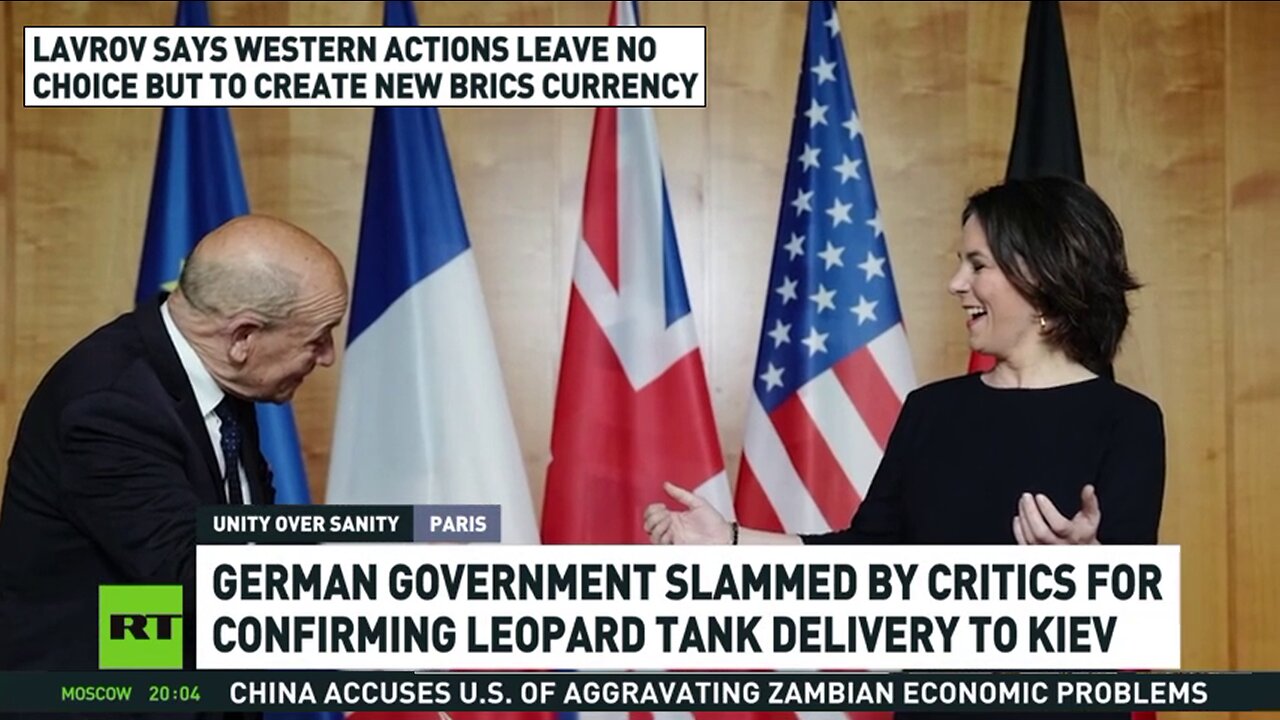Premium Only Content

RT News - January 25th 2023
Russia says Berlin's decision to send tanks to Kiev is a serious escalation, also stating redlines no longer exist for the West.
-
Germany's Foreign Minister says the EU should unite in its war against Russia, despite polls showing most people oppose the decision, as the country's officials previously pledged to stay out of the fight. Rachel Marsden reports, Adamu Garba II reports.
-
Sergei Lavrov, Russia's FM was in Angola today as part of his scheduled tour of Africa ahead of South Africa taking the chair of BRICS this year. Proposed new currencies for trade in the bloc have been criticised by the west and FM Lavrov said the west can betray countries at any time. Teresa Issenguele, a local correspondent reports and says Russia's visit is like the homecoming of an old, good friend to Africa. Natalya Zeiser (Valdai) explains the importance of good relations and FM Lavrov's visit.
-
Zambia/China. China says the US better mind its own financial problems instead of accusing Beijing of being responsible for the economic crisis across the African continent. Katlego Msomi (local correspondent) reports.
-
Israel/Palestine. The EU slams Israel's actions towards Palestine and is preparing to give $325 million in aid. (QS that doesn't bring back the lost lives though, does it) The demolition of the village in Al-Khan Al-Ahmar still doesn't seem to be resolved and protests continue. See previous posts for background.
-
Rwanda/DRC - a DRC military plane has been shot by Rwanda saying it violated the country's air-space, tensions increase as M23 rebels are still supported by Rwanda. Very complicated, please see previous posts to catch up. I will try and get more info and post tomorrow if I can find some, it seems as if RT is the only outlet who is reporting.
==============================================
Below, via RT website 1) --- Germany ‘at war’ with Russia – FM
2) --- Biden makes Ukraine tank announcement
3) --- Scholz trampled on key post-WWII principle – MP
4) --- Major Ukrainian offensive thwarted – official
5) --- Energy subsidies come at huge cost for German economy – Reuters
6) --- Amazon workers stage ‘historic’ strike
Analysis 7) --- Fyodor Lukyanov: NATO has already destabilized Europe, is it about to deliver the same medicine to Asia?
OP-ED 8) --- Goodbye empire? US sanctions are failing in the face of multipolarity
===============================================
25 Jan, 2023 15:42
1) --- Germany ‘at war’ with Russia – FM
Annalena Baerbock made the admission in a debate with EU colleagues, pushing for the delivery of tanks to Kiev
Arguing in favor of sending tanks to Kiev, German Foreign Minister Annalena Baerbock said EU countries were fighting a war against Russia. US and EU officials have previously gone out of their way to claim they were not a party to the conflict in Ukraine.
“And therefore I’ve said already in the last days – yes, we have to do more to defend Ukraine. Yes, we have to do more also on tanks,” Baerbock said during a debate at the Parliamentary Assembly of the Council of Europe (PACE) on Tuesday. “But the most important and the crucial part is that we do it together and that we do not do the blame game in Europe, because we are fighting a war against Russia and not against each other.”
While Chancellor Olaf Scholz has insisted that Germany ought to support Ukraine but avoid direct confrontation with Russia, his coalition partner Baerbock has taken a more hawkish position. According to German media, her Greens Party has been in favor of sending Leopard 2 tanks to Kiev, and eventually managed to pressure Scholz into agreeing. Defense Minister Christine Lambrecht, who was reluctant to send tanks to Ukraine, was pushed to resign.
see tweets https://twitter.com/mtracey/status/1618217167388053504
https://twitter.com/ivan_8848/status/1565067553671626760
This is not the first time Baerbock has made waves with her position on the conflict. She told an EU gathering in Prague last August that she intends to deliver on her promises to Ukraine “no matter what my German voters think.”
Quoting Baerbock’s words on Wednesday, Russian Foreign Ministry spokeswoman Maria Zakharova said the West just keeps admitting that they had been planning the current conflict for years.
“If we add this to Merkel’s revelations that they were strengthening Ukraine and did not count on the Minsk agreements, then we are talking about a war against Russia that was planned in advance. Don’t say later that we didn’t warn you,” Zakharova insisted.
Former German chancellor Angela Merkel told German media in early December that the 2014 ceasefire brokered by Berlin and Paris was actually a ploy to “give Ukraine valuable time” for a military build-up. Former French president Francois Hollande has confirmed this, while Ukraine’s leader at that time, Pyotr Poroshenko, openly admitted it as well.
Russia’s operation in Ukraine was a “forced and last-resort response to preparations for aggression by the US and its satellites,” former Russian president Dmitry Medvedev claimed on Monday.
https://www.rt.com/news/570469-germany-war-russia-baerbock/
==============================================
25 Jan, 2023 17:05
2) --- Biden makes Ukraine tank announcement
The US will send 31 Abrams tanks to Kiev
The US will send 31 Abrams main battle tanks to Ukraine, President Joe Biden announced in a hastily scheduled speech on Wednesday, after Germany said it would start delivering its Leopard MBTs to the government in Kiev.
The speech was announced on Wednesday morning as a last-minute addition to the White House schedule.
Calling the Abrams the “most capable tanks in the world,” Biden noted they are complicated to operate and maintain and as such Washington will also provide “parts and equipment necessary to effectively sustain these tanks on the battlefield.”
Biden insisted the tanks were a “defensive” weapon and not a threat to Russia, while praising Ukraine as “fighting for freedom” and pointing out the announcement coincided with President Vladimir Zelensky’s birthday.
Earlier in the day, German Chancellor Olaf Scholz said Berlin would send 14 of its own Leopard 2A6 tanks to Ukraine and allow other EU and NATO countries to do the same with theirs. “We are acting in a closely coordinated manner internationally,” Scholz said in a statement.
Poland had pushed for sending the Leopards to Kiev as part of an “international coalition,” but the move required Berlin’s approval. German officials signaled last week that the US would need to commit to sending the Abrams tanks first.
The US military has reportedly been reluctant, considering the gas-guzzling, turbine-powered Abrams too difficult to operate and maintain and too heavy for Ukrainian infrastructure.
According to Biden, the US and its allies have provided Ukraine over 3,000 armored vehicles and over 8,000 artillery pieces so far. Moscow has warned the West that such deliveries only prolonged the conflict and risked drawing the West into direct confrontation.
Russia’s ambassador to Washington has described the rumored delivery of US tanks to Kiev as “another blatant provocation” by the “real aggressor” in the conflict, adding that they will “no doubt be destroyed” along with other hardware that NATO has poured into Ukraine over the past year.
https://www.rt.com/news/570478-biden-ukraine-abrams-tanks/
================================================
25 Jan, 2023 15:45
3) --- Scholz trampled on key post-WWII principle – MP
Petr Bystron of the far-right Alternative for Germany party slammed the chancellor’s decision to give Ukraine Leopard tanks
A member of parliament from the right-wing Alternative for Germany (AfD) party has accused Chancellor Olaf Scholz of undermining one of the fundamental principles of Germany’s foreign policy since the end of World War II. Petr Bystron’s criticism came in response to Scholz’s decision to provide Ukraine with 14 Leopard tanks.
Addressing the chancellor in the German parliament on Wednesday, Bystron argued that Scholz would “go down in history” as a leader who had negated the “never again” tenet long espoused by Berlin. According to the AfD lawmaker, this principle was taken to mean, among other things, abstention from weapons exports to conflict zones.
He went on to remind fellow MPs and the chancellor that Germany bears special responsibility for the victims of World War II, including those in the Soviet Union.
Bystron suggested that Scholz’s latest decision was in stark contrast to the legacy of his “great” Social-Democratic predecessors, such as Willy Brant and Helmut Schmidt, who had “done a lot for peace and reconciliation.”
“Millions of [German] citizens are asking themselves: ‘Why, what for did you do that?’” the AfD politician claimed.
Bystron went on to allege that, by deciding to supply military hardware to Kiev, Scholz had gone “back on his own campaign promises” and gone “against the majority of the country.”
The MP also questioned just how much difference 14 tanks would make on the battlefield in Ukraine.
Responding to the criticism, Scholz acknowledged that Germany had indeed departed from the principles set out by Brant and Schmidt. This, however, was solely the result of “Russia attacking Ukraine,” according to the chancellor. He accused Moscow of waging an “imperialist war.”
Earlier on Wednesday, Chancellor Scholz announced the decision to ship 14 Leopard 2A6 tanks from its own stock to Kiev. He argued that this “follows our well-known line of supporting Ukraine to the best of our ability.”
The statement represented a major U-turn as Berlin had long resisted calls to donate the armor despite growing pressure from its allies.
Russian officials claim Western weapons deliveries to Ukraine only serve to unnecessarily prolong the conflict and could lead to a direct confrontation between NATO and Russia.
https://www.rt.com/news/570471-german-mp-criticizes-scholz-tanks-ukraine/
===============================================
25 Jan, 2023 10:58
4) --- Major Ukrainian offensive thwarted – official
A ‘preemptive’ Russian attack forced Ukrainian forces to call off a planned offensive in Zaporozhye Region, a local official says
The Russian military has forced Ukraine to call off a planned offensive in Zaporozhye Region, senior local official Vladimir Rogov has said.
Kiev had been preparing a major operation in the direction of Melitopol and Berdyansk and “promoted the operation several times to a Western audience,” Rogov told Komsomolskaya Pravda Radio on Wednesday.
The Russian forces “launched a preemptive attack... and not only thwarted those plans, but gained and seized the strategic advantage and took the initiative into their own hands,” he claimed.
In a separate comment to RIA Novosti news agency, the official said that, in order to defend its positions in Zaporozhye, Kiev now has to redeploy troops from other parts of the front, including from Donbass, where heavy fighting is currently underway for control of the strategic town of Artyomovsk/Bakhmut.
The Russian military has been making localized advances in Zaporozhye Region over the past week, approaching the towns of Orekhov and Gulaypole. Orekhov is located some 60km northeast of the city of Zaporozhye, which is a major industrial center, sitting on the Dnieper River.
The authorities in Zaporozhye Region have been warning about a Ukrainian plan to launch an offensive in the area since autumn. They said the strike by Kiev’s troops could target Melitopol, Berdyansk and Energodar, home to Europe's largest nuclear power plant, with the aim of reaching the Sea of Azov and severing Russian supply lines.
Zaporozhye Region was incorporated into the Russian state in early October together with Kherson Region and the People’s Republics of Donetsk and Lugansk following referendums, in which the populations of those areas overwhelmingly supported joining Russia.
It is estimated that Russia currently controls around 70% of the Zaporozhye Region, with Ukraine holding the regional capital Zaporozhye, which had a population of around 1 million before the conflict.
https://www.rt.com/russia/570449-zaporozhye-offensive-ukraine-rogov/
================================================
25 Jan, 2023 15:02
5) --- Energy subsidies come at huge cost for German economy – Reuters
Berlin is expected to spend $18 billion on electricity subsidies through May
A financial aid package aimed at helping German businesses and households deal with the energy crisis will cost the federal government more than €16.6 billion ($18 billion) by the end of May, a document seen by Reuters shows.
Berlin is expected to spend some €14.5 billion ($15.75 billion) to set an electricity price cap, and an additional €2.14 billion ($2.33 billion) on subsidizing transmission network costs over the next two months, according to a document signed by Finance State Secretary Florian Toncar, addressed to parliament’s budget committee.
The electricity price cap, which is projected to relieve the pressure of skyrocketing prices on consumers, will be entirely funded by the federal government. The cost of the measure, which is set to expire in April 2024, is expected to considerably top the €16.6 billion ($18 billion) Berlin will spend through May.
The German parliament’s budget committee is expected to approve the spending plan on Wednesday.
Last year, Berlin announced plans to spend some €83.3 billion ($82.8 billion) on funding the electricity price cap for 2023. It is part of the €200 billion ($199 billion) “defensive shield” which the government said it would allocate to help the country’s business and households cope with soaring energy prices.
Over the past several months, European benchmark gas prices have been lower than anticipated thanks to mild weather that helped to keep gas inventories at higher-than-usual levels. Moreover, weak demand for the fuel from Asian consumers helped European buyers acquire the redirected cargoes that were initially destined for Asia.
https://www.rt.com/business/570457-germany-energy-crisis-spending/
===================================================
25 Jan, 2023 13:24
6) --- Amazon workers stage ‘historic’ strike
UK workers are demanding a pay raise and better conditions, claiming ‘robots are treated better’
Amazon union workers in the UK are striking for the first time ever. They are complaining that their wages are below inflation-linked rates and are describing working conditions as “severe.”
Members of the GMB Union working at the retailer’s warehouse in Coventry voted to hold a “historic” industrial action after Amazon offered a 50-pence-per-hour (62 cents) increase in pay last month. The workers have rejected what they called a “derisory” pay rise, demanding instead an increase to £15 ($18.48) per hour.
The 24-hour strike began on Wednesday after midnight, with GMB saying it expects 300 employees out of a total of 1,000 at the plant to join the walkout.
“After six months of ignoring all requests to listen to workers’ concerns, GMB urges Amazon UK bosses to do the right thing and give workers a proper pay rise,” GMB senior organizer Stuart Richards said in a statement.
Last August, Amazon offered to increase pay to between £10.50 and £11.45 per hour which employees interviewed by the BBC said was a “smack in the mouth” given the company's profits and spiraling inflation.
“These people had worked two years through the pandemic, that had seen Amazon's shares go through the roof, they had seen the profits just become unimaginable,” a company warehouse worker, Darren Westwood, told the media outlet.
The strikers are also demanding better working conditions, complaining about long working hours, frequent injuries, and the unrelenting pace of work, as well as an aggressive, tech-enhanced monitoring of employees.
“Someone the other day said we’re treated like robots – no, robots are treated better,” Westwood told CNBC.
In response, Amazon said in a statement that the size of the strike is “only a fraction of 1 percent of our UK employees.” The action comes as the US tech giant is laying off 18,000 workers worldwide in a bid to adjust to a dramatic slowdown in online sales, after consumers resumed pre-pandemic offline shopping.
The company has postponed the opening of new warehouses and halted hiring in its retail group. Earlier, Amazon said that it planned to close three of its depots in the UK, which will impact about 1,200 employees
https://www.rt.com/business/570460-uk-amazon-workers-strike/
==============================================
25 Jan, 2023 13:56
7) --- Fyodor Lukyanov: NATO has already destabilized Europe, is it about to deliver the same medicine to Asia?
The US-led bloc appears to be using Japan as a Trojan horse to gain a foothold in the region and maintain its relevance - By Fyodor Lukyanov, the editor-in-chief of Russia in Global Affairs, chairman of the Presidium of the Council on Foreign and Defense Policy, and research director of the Valdai International Discussion Club
Currently, the world's attention is focused on the European theater of war, but some very interesting events are also unfolding in Asia.
Japan is the most illustrative. Until recently, the country was reluctant to peddle a militant attitude either in terms of weaponry or even in using economic pressure. Things are changing, and this is a strong indicator of the transformation of the international arena.
Prime Minister Fumio Kishida has just completed a tour of the US and the leading countries in Western Europe. Contrary to usual custom, there was virtually nothing but military rhetoric everywhere. In a policy statement delivered in Paris, Kishida stressed that the security of Europe and the Indo-Pacific region are inextricably linked and must be ensured collectively.
Other statements in Rome, London and Washington confirmed the new trend: In the security field, Japan no longer intends to limit itself exclusively to its relationship with the US, though it forms the basis of its entire defense strategy. Now, Tokyo seeks a much broader engagement with the main Western bloc (NATO), subject to its gradual reorientation towards the Pacific space.
This is a new scheme. Since the Cold War, the security system in Asia has been America-centric but not unified, instead based on different groups of countries or bilateral relationships. The US has been the fixed element, the others have varied. Recent innovations such as the "QUAD" involving Japan, India, Australia, and an "Anglo-Saxon club" of the Americans, British and Australians have not disturbed the usual logic.
However, something else is emerging – the transfer to greater Asia of the principle of a consolidated alliance, moreover, with European allies to whom the region poses no security threats.
At the heart of the strategy is the logic of Washington, which proceeds from the inevitability of strategic rivalry with China and Beijing’s Asian neighbours, or more precisely, its most bellicose ones.
There is no doubt in the US that Beijing will be a major challenge to the American position in the world for years or decades to come. It is discussed in doctrinal documents and it guides the military’s entire posture. Russia is seen as an acute, but short-lived and transient, threat because of what Washington sees as its limited aggregate capabilities.
The open discourse on Ukraine as a testing ground for US weapons and Russia as an example to China suggests that the Americans see the current campaign as a test run for different means of influencing the future. In this context, the question of NATO’s status naturally arises.
The bloc's current unity against Russia has solved a problem it has been unable to deal with for years, namely a lack of mission clarity. But if the Chinese threat takes priority, it again raises the question of the usefulness of a mighty organization with a purely Euro-Atlantic base. Meanwhile, it is difficult to interest European countries in an anti-Chinese agenda. Unlike the US, Western Europe does not see China as a direct threat. On the contrary, economic cooperation with Beijing is extremely beneficial.
The way out is twofold. Firstly, the linking of Russia and China into a single anti-democratic and revisionist conglomerate has been going on for a long time. In other words, by opposing Beijing, you oppose Moscow and vice versa. Secondly, what is needed is a respectable and closely aligned regional leader who will spearhead NATO's reorientation towards the Far East. Japan seems willing to take on this role.
Late last year, Tokyo adopted a new version of its national security strategy, considered the biggest shift since World War II. Japan is ready to accept much greater military responsibilities than before. In this document, a distinction is made between European and Asian security. For example, Russia's actions are interpreted somewhat differently in Europe and Asia, being noticeably regarded as less of an issue in the latter. But China falls into the category of unambiguous threats.
The Japanese leadership's activism coincides with US interests, but among its motivations is an element of distrust of the Americans. Donald Trump, who referred to Japan and South Korea as ‘dependents’, is too fresh in their mind, and what will come after Joe Biden is unknown.
Accordingly, the idea of an intensive relationship with the whole of NATO is also a way to protect themselves from possible American mismanagement.
Whether Western Europeans will seriously engage with Asian security issues remains to be seen. What is clear is that a tight and tangled knot is emerging in East Asia. This is especially true when considering all the intricacies surrounding China and the newly revived inter-Korean tensions, in response to which, officials in Seoul have begun to speak about the possibility of acquiring nuclear weapons – whether borrowed or their own.
As recently as two decades ago, there was a constant mantra that a repeat of the confrontation of 20th century Europe would not be allowed to migrate to Asia. It now seems that this has been turned on its head.
https://www.rt.com/news/570466-fyodor-lukyanov-us-japan-asia/
================================================
25 Jan, 2023 15:51
8) --- Goodbye empire? US sanctions are failing in the face of multipolarity
Washington’s go-to methods can’t prevent the rise of other powers, an influential establishment journal admits - OP-ED By Felix Livshitz
Foreign Affairs, a highly influential US magazine – effectively a US empire house journal – has published an article detailing how sanctions are quickly losing their efficiency as a weapon in Washington’s global arsenal.
Published by the Council on Foreign Relations NGO, Foreign Affairs provides space for officials within the US military industrial complex to communicate with one another on matters they believe to be of the utmost significance. Therefore, it is important to pay attention when the magazine makes major pronouncements on any issue.
It recently published an appraisal of US sanctions – the conclusion being that they are increasingly ineffective, have prompted Beijing and Moscow to create alternative global financial structures to insulate themselves and others from punitive actions, and that Washington and its acolytes will no longer be able to force countries to do their bidding, let alone destroy dissenting states, through such measures in the very near future.
The article begins by noting that “sanctions have long been the US’ favored diplomatic weapon,” which “fill the void between empty diplomatic declarations and deadly military interventions.” Despite this, it predicts “the golden days of US sanctions may soon be over.”
These “golden days” were the immediate post-Cold War era, when Washington was “still an unrivaled economic power,” and therefore could at the press of a button cripple each and every overseas economy, in theory. This was due to “primacy of the US dollar and the reach of US oversight of global financial channels.”
As international trade was overwhelmingly conducted using dollars, Washington could stop any country from exporting or importing any and all goods it wished, whenever it liked. Even then, Foreign Affairs recalls, US leaders themselves worried if sanctions were applied too liberally. In 1998, then-President Bill Clinton claimed his government was “in danger of looking like we want to sanction everybody who disagrees with us.”
The Foreign Affairs article says Clinton’s fears were “overblown,” but this is precisely what came to pass. Governments, and the countries they represented, have been sanctioned for pursuing the wrong policies, refusing to be overthrown in US-backed coups and military interventions and showing any degree of independence in their domestic or foreign dealings whatsoever. In the process, millions have died, and even more lives have been ruined for no good reason.
This approach has backfired, and badly. In response, states “have begun to harden their economies against such measures.” For example, after the US cut off Iran from the SWIFT global banking system, many other countries took note. Restricting China’s access to numerous technologies as part of the new Cold War has also served to place both Washington’s allies and adversaries alike “on notice their access to crucial technology could be severed.”
Beijing and Moscow lead the way in the push to create “financial innovations that diminish US advantage,” creating a raft of “currency swap agreements, alternatives to SWIFT, and digital currencies” that serve as “preemptive measures” against any “potential penalties” down the line.
Currency swaps, which connect central banks directly to each other and eliminate the need for trades between them to be dollar-backed, have been eagerly embraced by China. It has signed deals of this kind with more than 60 countries across the world, thereby enabling its companies “to circumvent US financial channels when they want to.”
In 2020, Beijing settled more than half its annual trade with Moscow in currencies other than the dollar, making the majority of these transactions totally immune to US sanctions, and that figure has only risen ever since. In March that year also, the China and Russia-led Shanghai Cooperation Organization officially prioritized development of payments in the local currencies of its members.
Beijing and Moscow are also, Foreign Affairs reports, “busily preparing their own alternatives” to various Western-dominated international systems. Their alternative to SWIFT, the Cross-Border Interbank Payment System, isn’t yet a match in terms of transaction volume, but that’s not the point. It prevents them, and any state or organization enrolled in the framework – 1,300 banks in over 100 countries already – from being unable to make international financial transactions, should they be cut out of SWIFT.
Similarly, China is expanding the reach of the digital renminbi, the currency issued by Beijing central bank, at home and overseas. More than 300 million of its citizens already use it, and a billion are forecast to by 2030. The currency is completely sanctions-proof as the US has no ability to prevent its use, and Beijing has encouraged several countries to pay for its exports exclusively using it – “other such deals will probably follow,” Foreign Affairs predicts.
The American empire’s obsessive reliance on sanctions has now created a Catch-22 situation, by the magazine’s reckoning. The already hostile relations between the USA, China and Russia mean Moscow and Beijing are pushing ahead with this revolutionary effort no matter what. If “things get worse,” they’ll simply “double down on their sanctions-proofing efforts,” taking more and more countries with them.
“These innovations are increasingly giving countries the ability to conduct transactions through sanctions-proof channels. This trend appears irreversible,” the article bitterly concludes. “All this means that within a decade, US unilateral sanctions may have little bite.”
It is all these developments, along with Moscow’s economic pivot eastwards after the 2014 Ukraine coup, and move towards self-sufficiency in energy and food and in other vital resources, which account for the embarrassing failure of US-led sanctions against Russia.
Western leaders, academics, journalists, pundits and economists promised when these sanctions were imposed that they would soon lead to Russia’s total political, economic and military collapse. They have not, demonstrating that elites in Europe and North America do not understand the global economy they claim to rule. They should get to grips with the new reality they inhabit in short order, though – for a multipolar world has begun to emerge in 2022, and it is here to stay.
How rapidly US elites are reckoning with the radically different reality in which they are now forced to operate is ironically underlined by how quickly the author of the Foreign Affairs article, Agathe Demarais, seems to have completely changed her tune on the subject of sanctions. On 1 December, less than a month earlier, she authored a piece for Foreign Policy – another US empire in-house journal – that offered a radically different take on the matter.
Boldly declaring “sanctions on Russia are working” in the headline, Demarais dismissed suggestions punitive Western measures were intended to “force Putin to back down and pull out of Ukraine,” or to provoke “regime change” in Moscow, or to prompt “a Venezuela-style collapse of the Russian economy,” despite the fact every single one of these outcomes was explicitly cited as a motivating factor behind the sanctions by Western officials, pundits, and journalists at the time.
Instead, she argued, sanctions were effective in the quest to “send a message to the Kremlin” that “Europe and the United States are standing with Ukraine.”
Whether or not Kiev will be thrown under a bus by its Western backers in due course, and the anti-Russian measures will endure after the war is over, seems to not matter so much, though – for, as Demarais was herself forced to acknowledge less than four weeks later, the effectiveness of sanctions is rapidly diminishing. This speed of this about-face could well be an indication of how irresistibly the multipolar world is coming to be.
"...The statements, views and opinions expressed in this column are solely those of the author and do not necessarily represent those of RT... "
https://www.rt.com/news/569926-us-sanctions-not-work/
================================================
-
 30:45
30:45
The Kevin Trudeau Show Limitless
19 hours agoThe 3 Money Lies Keeping You Broke in 2025 {Financial Freedom Explained}
4615 -
 7:31
7:31
ARFCOM News
16 hours ago $0.07 earnedATF Feeling "Demoralized", Trump Tries To Cut Their Budget | Rs Obstructing Pro-Gun Bills
230 -
 5:07
5:07
The Shannon Joy Show
10 hours agoFed Up! Government's Dystopian Nightmare and Broken Promises
6275 -
 23:08
23:08
Chris From The 740
1 day ago $0.04 earnedUnboxing the CZ Nocturne F SR – First Impressions & Features Revealed!
1212 -
 53:14
53:14
Feds For Freedom
2 days ago85. The End of the Legacy Media and Surge of Citizen Journalism | Sam Anthony | The Feds
76 -
 2:38
2:38
BIG NEM
9 hours agoThey Faked Being from Toronto… And Got EXPOSED
31 -
 35:37
35:37
Esports Awards
15 hours agoLuiz Felipe Tavares from Sim Racer to Real F4 Driver | Origins Podcast #6
25 -
 3:31:23
3:31:23
FreshandFit
8 hours agoAfter Hours w/ Girls
418K55 -
 1:08
1:08
Terrence K Williams
10 hours agoWHO WORE IT BEST 😂 Michelle Obama is going to be mad at me.
125K93 -
 2:20:25
2:20:25
Badlands Media
13 hours agoDevolution Power Hour Ep. 352: Patriot Puppets, Global Pincers, and the Battle for Sovereignty
79.6K22